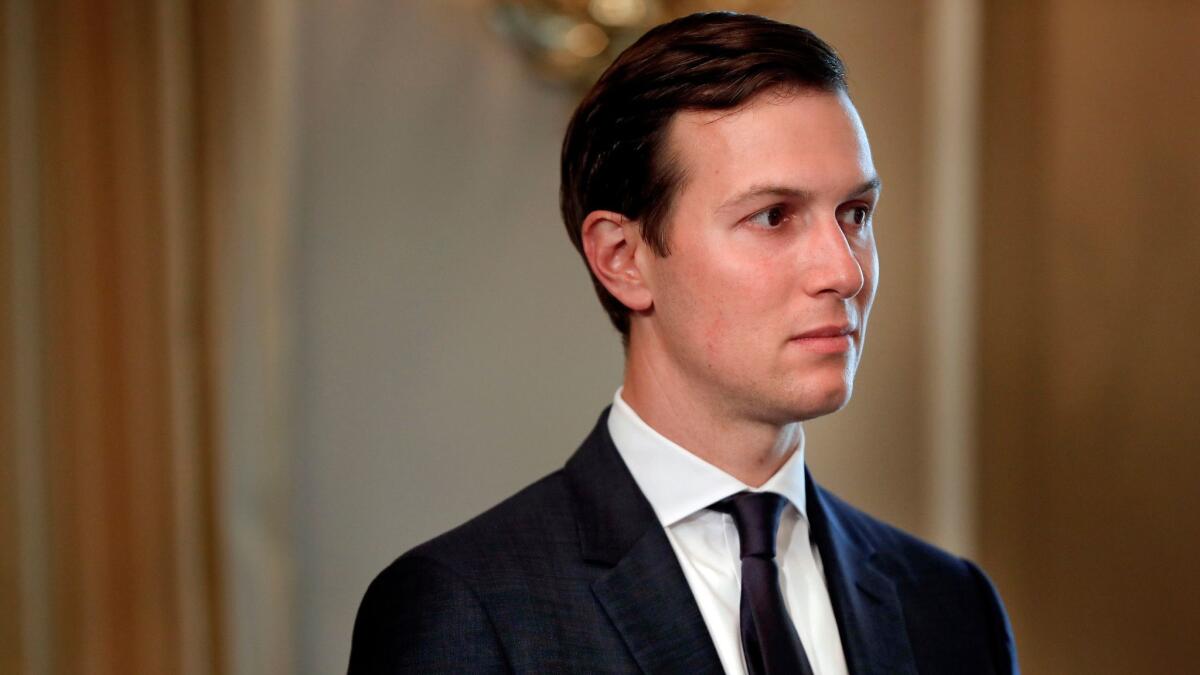Editorial: Fire Jared Kushner

- Share via
Jared Kushner, President Trump’s son-in-law and advisor-with-too-many-portfolios, has lost his interim “top secret” security clearance. Is that a reason for him to give up his duties at the White House?
Of course it is. It’s hard to see how Kushner could continue to serve as a point man for Arab-Israeli negotiations if he doesn’t have access to the president’s daily briefing and other highly sensitive information. And even if he were to relinquish that responsibility, his downgraded status would make it difficult for him to serve as an all-purpose counselor for his father in-law.
To be brutally frank about it, Kushner isn’t qualified for his lofty position.
Yet it’s important not to fixate on the security-clearance issue. Kushner’s presence in the highest councils of the administration would be objectionable even if he passed his background check with flying colors.
To be brutally frank about it, Kushner isn’t qualified for his lofty position. His appointment as a senior advisor in the White House is an obvious and offensive exercise in nepotism.
The same is true of the designation of his wife, Ivanka Trump, as a “special advisor” to her father. In that capacity, she recently materialized in South Korea to “reaffirm our commitment to our maximum-pressure campaign to ensure that the Korean Peninsula is denuclearized.” Her proud father, with characteristic disdain for the truth, tweeted: “We cannot have a better, or smarter, person representing our country.”
All presidents, even those with the deep expertise in politics and government that Trump so spectacularly lacks, will turn to family members or friends for advice at times. Ronald Reagan was counseled by his wife Nancy to explore the possibility of better relations with the Soviet Union. Bill Clinton asked Hillary Clinton to help prepare his administration’s healthcare proposals, a more formal assignment that raised eyebrows at the time.
President John F. Kennedy famously nominated his brother Robert F. Kennedy as U.S. attorney general, an audacious act of nepotism of a kind that would be impossible now. A 1967 law prohibits a public official from appointing a relative to a civilian position “in the agency in which he is serving or over which he exercises jurisdiction or control.”
The value of that law should be obvious. In addition to guarding against the appointment of officials chosen only for their family ties, the law prevents a situation in which an appointee can be entrenched in office despite poor performance, or insulated against the normal criticism of colleagues and members of Congress, because he or she is related to the president.
Last year, the Justice Department’s Office of Legal Counsel advised that Kushner’s appointment wasn’t barred by the anti-nepotism law because a later law gave the president broad authority over White House hiring. The department also cited a court ruling holding that the White House Office isn’t an “agency.”
But installing a close relative in the White House in an official position certainly violates the spirit of the anti-nepotism law. And, despite the emphasis our bottom-line-minded president has placed on the fact that Kushner isn’t being paid, that’s irrelevant. What matters is that the president has installed a family member in an influential position.
We don’t know what lies behind the decision not to grant Kushner a permanent “top secret” security clearance. His background investigation has been complicated by his wealth and elaborate business dealings and by his repeated failure to file complete information.
Whatever the explanation, Kushner has been hobbled in performing duties for which he had no compelling qualification in the first place — other than having married the boss’ daughter. He should pack up and return to New York.
Follow the Opinion section on Twitter @latimesopinionand Facebook
More to Read
A cure for the common opinion
Get thought-provoking perspectives with our weekly newsletter.
You may occasionally receive promotional content from the Los Angeles Times.










